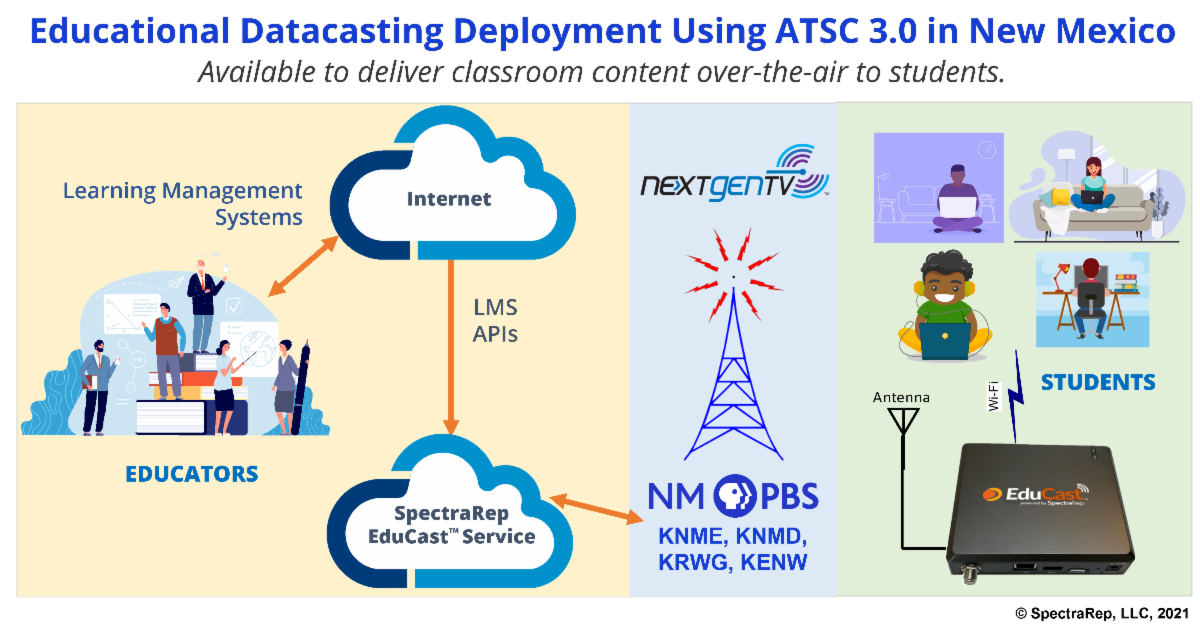NextGen TV: SpectraRep’s EduCast Selected to Deliver Classroom Content to Students Via ATSC 3.0 Broadcasts in N.M.
The pilot project in New Mexico to deliver classroom content via ATSC 3.0 broadcasts to students without broadband services is the first U.S. educational datacasting deployment using NextGen TV services

CHANTILLY, Va.—In the first deployment of educational datacasting services using NextGen TV services, SpectraRep’s EduCast datacasting service has been selected by the New Mexico Public Education Department (NMPED) to deliver classroom content via ATSC 3.0 broadcasts to students without access to sufficient broadband services in their homes.
The project, which kicked off in late November 2021, marks the first time in the United States that educational datacasting will be deployed using ATSC 3.0. Project partners include: New Mexico PBS (KNME and KNMD), KENW Eastern New Mexico University, KRWG New Mexico State University, CTC Technology & Energy, and CLARO Consulting.
“SpectraRep mobilized to deliver a fast and efficient rollout of our EduCast service in New Mexico,” said Mark O’Brien, SpectraRep president. “Within a short period, we delivered the hardware and software necessary for schools and families to begin using the secure functionality of datacasting to access educational content no matter where the students live. We are pleased to be selected by New Mexico to address the issue of equity in education head-on.”
EduCast will use television broadcast signals controlled by the New Mexico PBS stations to send educational materials over the air as files into student homes. These stations reach 98 percent of all New Mexico homes. Inside the home, a receiver will convey the information to the student’s Chromebook or other digital devices. Distribution of the 2,000 datacasting receivers began in November.
“New Mexico’s public television stations are excited about this partnership with our Public Education Department and a new opportunity to extend our mission to educate and engage -- anytime, anywhere,” said Franz Joachim, New Mexico PBS general manager and CEO. In a recent story, The Associated Press noted that datacasting can mitigate the digital divide for New Mexico students who were previously having to learn with limited or no connectivity.
“The main opportunity of datacasting is delivering a reliable method for students to call up classroom lessons or other educational materials much as they would tune in to watch any PBS programming through their broadcast television signal. We believe datacasting could be an important piece in the jigsaw puzzle that is universal digital access,” added Mark O’Brien.
The New Mexico pilot is funded by an award from Gov. Michelle Lujan Grisham out of the Governor’s Emergency Education Relief Fund (GEER), a pandemic relief measure from the U.S. Department of Education. New Mexico public television covers the entire state with a network of broadcast translators in addition to their full-power stations.
The professional video industry's #1 source for news, trends and product and tech information. Sign up below.
“Leveraging opportunities created by digital broadcasting, we can devote a small part of our channel space to send internet content directly to students who lack sufficient broadband connectivity. Without affecting our television broadcasts in any way, we will create a pathway from teacher to student – bridging the digital divide and delivering content designed for internet distribution to homes that lack internet capabilities. We are proud to provide part of the solution to one of New Mexico’s most pressing problems,” Joachim said.
George Winslow is the senior content producer for TV Tech. He has written about the television, media and technology industries for nearly 30 years for such publications as Broadcasting & Cable, Multichannel News and TV Tech. Over the years, he has edited a number of magazines, including Multichannel News International and World Screen, and moderated panels at such major industry events as NAB and MIP TV. He has published two books and dozens of encyclopedia articles on such subjects as the media, New York City history and economics.

